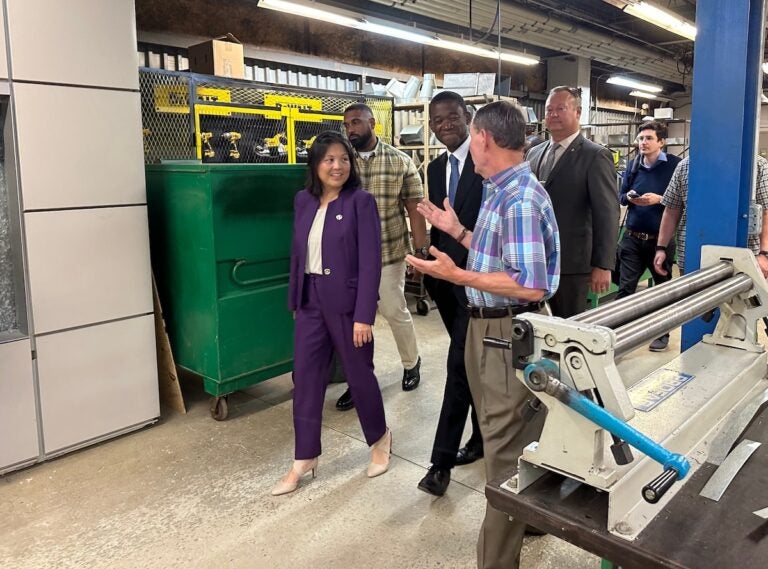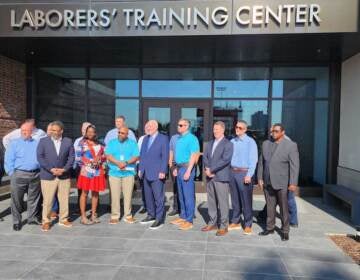Why Philly’s sheet metal workers got a visit from the Biden-Harris administration
Businesses using tax credits from the Inflation Reduction Act must use apprentices from registered programs — like one in Philly.
Listen :51
U.S. Treasury Deputy Secretary Adewale Adeyemo and Acting Secretary of Labor Julie Su tour the International Association of Sheet Metal Workers Union Local 19 training center in Philadelphia with Wayne Miller, president of the Philadelphia Building and Construction Trades Council. (Kristen Mosbrucker-Garza/WHYY News)
From Philly and the Pa. suburbs to South Jersey and Delaware, what would you like WHYY News to cover? Let us know!
At 35 years old, Kim Harris is on his third trade skill in the construction industry because he wasn’t interested in sitting in front of a computer all day.
He started as a pipefitter in Georgia but was laid off during the COVID-19 pandemic. After coming home to Palmyra, New Jersey, he found a job as a metal sign builder.
Harris is now training as an apprentice to become a sheet metal worker with the Local 19 union at its Philadelphia Training Center. The apprenticeship program is registered with the federal government and was highlighted as a national model last week when officials with President Joe Biden’s administration visited the location.
“This is kind of a mix between using your brain and using your hands. So that’s kind of why I really enjoy it,” he said.
Harris said he wanted to keep improving his skills because he can earn more money as a sheet metal worker as opposed to a sign maker.
For example, in Philadelphia the prevailing wage for a sign maker is $25 an hour whereas a sheet metal worker can earn $59 an hour. He hopes that the pay bump will help him raise his one-year-old and nine year old sons and support his girlfriend, who is a nurse.
“You get treated with respect. You’re never getting treated like a piece of dirt,” he said. “You’re there [on a job site] with a purpose, you complete your mission and go on to the next mission. It’s good for me.”
During the visit from federal officials, U.S. Department of Labor Acting Secretary Julie Su said the union’s apprenticeship program was high quality and the Biden administration wants to support it.
“Programs with real standards with good wages with a real pathway of long term security,” Su said.
U.S. Congress earmarked money for the Department of Labor to help support registered training apprenticeship programs to help build the skilled trades industry. The Department of Labor passed along $1.5 million to Pennsylvania to strengthen these registered training programs since the Inflation Reduction Act requires the usage of them on specific projects.
While the federal funding was not directly tied to the Philadelphia Training Center apprenticeship program, it’s possible they could get a slice of that money from the state like they did in 2018.
Federal officials highlighted rules for projects seeking tax credits under the Inflation Reduction Act. Businesses must pay prevailing wages and hire trade apprentices trained from registered programs.
If the project is worth $35 million or more, project labor agreements must be used. These project labor agreements are collective bargaining agreements with labor organizations, such as unions, which may include diversity clauses that require local hiring of historically disadvantaged workers from underrepresented communities.
U.S. Treasury Deputy Secretary Adewale Adeyemo said the goal is to encourage businesses to support registered training programs.
“What we’re hoping that it’ll do is that it’ll mean there are going to be more people showing up at Local 19 looking to get trained for their apprenticeships because there’ll be project labor agreements where we need them,” Adeyemo said.
He added that requiring businesses to pay prevailing wages would be a big deal for workers.
In 2022, 40,000 construction workers in the Philadelphia area earned less than the prevailing wage, according to the U.S. Census. If those workers were paid prevailing wages instead, the average worker would see their pay increase by $38,000 over one year, according to calculations from the U.S. Treasury Department.
And that’s one reason why Germantown native Terrence Neal joined the Local 19 apprenticeship program.
Neal has experience in residential construction projects but earned less in that side of the industry.
“Renovations and additions, just working on houses and stuff,” he said.
He holds a bachelors’ degree in business administration and went to college on a basketball scholarship but wasn’t sure what to do after graduation. He’s hoping to earn enough to comfortably take care of his three daughters, two of whom are young teenagers and a one year old plus his girlfriend.
“Just being able to make them happy makes me happy so this is a great way to provide,” he said.
WHYY is your source for fact-based, in-depth journalism and information. As a nonprofit organization, we rely on financial support from readers like you. Please give today.






